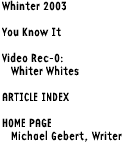


But advertising hits a slump—and books start hitting the stores with titles like The Fall of Advertising and the Rise of PR or The End of Advertising As We Know It. The Roman Empire note is dead-on for our industry; I’m less convinced by the apocalyptic tone. Are we really the Hawaiian-shirted equivalents of steelworkers? Can we dismiss titles like these as hyped up to sell books—or is that what whalers told themselves when they first saw a book called Kerosene: The Lamp Oil You Don’t Have To Harpoon?
The first of these two books, written by PR consultants who’ve determined after careful study that PR is the answer to everything, is easy to dismiss because it’s so self-serving. But The End of Advertising As We Know It, by ex-Coca-Cola marketing director Sergio Zyman (John Wiley & Sons, $27.95), is harder to blow off. Zyman—who’s refreshingly willing to name brand names who wouldn’t listen to him—paints a harsh picture of an ad world that chases after awards and the latest trendy visual technique while not just neglecting the idea of delivering results, but being downright hostile to any suggestion that that is, in fact, its purpose.
Having supposedly established us as unconcerned with whether or not our clients succeed, he then devotes the bulk of his book to talking about the various ways companies can market their products and build their brands—besides advertising. In Zyman’s view, we’re just a big dead stump in the road that has to be gotten around in the course of your marketing.
NOW, YOU DON'T HAVE TO BUY ANY OF THIS (and I know your agency is nothing like he says) to be concerned. Why should you care what some ex-Coke consultant thinks? Because last July at a conference called Adwatch 2002, much the same was said by one Steven Heyer... who’s the current head of Coke. And Coke can’t be the only place where they think like this.
If there’s one thing that seems to have led to this attitude among big clients, it’s agencies insisting that 30-second TV spots are the only form of marketing that matters. It’s clear from Zyman, from Heyer (who told ad execs that TV advertising was less important to Coke than community outreach programs—ouch!), and from the general buzz about “the death of the 30-second spot,” that we’re seen to be biased in favor of this one way of reaching people. Yet egged on by awards shows and by trade media who handicap “the best spots,” never “the best in-store promotions,” we go on seemingly running our businesses for the sake of our reels. It’s not surprising, then, that a Forrester study found that 68% of marketers think their ad agency isn’t ready for a world in which things like TiVo have rendered the TV spot less important. Indeed, by the very next major ad conference in October, a big creative cheese, Euro RSCG’s Ron Berger, had felt the need to show that people at his level actually can “think beyond TV.”
You could argue that there are lots of reasons to say that our business isn’t really at a crisis point. But perception is reality if our clients see us as losing relevance in an era of change. Being out here freelancing, I have no idea how the big boys are reacting to this crisis of faith—are they doing damage control with their clients, or do they barely know a Zyman is out in the wilderness, preaching against them? You got me, but I do know how the two most-admired agencies in America are responding to the prospect of conventional advertising’s end.
Fallon McElligott is experimenting with things like its Internet mini-movies for BMW, as substitutes for conventional, zappable 30-second spots. And Wieden & Kennedy is actually developing its own entertainment, everything from TV shows to Broadway musicals, which its clients can then be part of from the very earliest stages—and in which they’ll be intertwined with the content at a level beyond the ability of any remote or TiVo to blip out.
They’re thinking about how they would serve their clients in an era when the 30-second TV spot and the whole agency structure built to serve it have been rendered obsolete. They’re thinking about how they’d survive in that era. What are the rest of us doing?